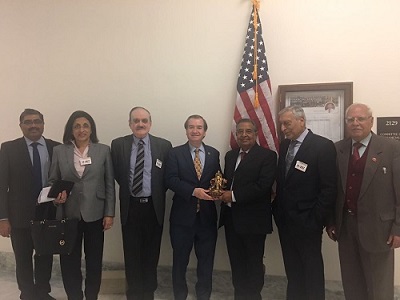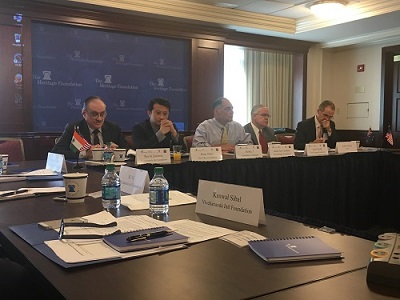A delegation from the VIF comprising Director, General NC Vij, Lt Gen Ravi Sawhney. Ambassador Kanwal Sibal, Lt Gen Davinder Kumar and Dr. Harinder Sekhon visited Washington DC from 28 February 2017 to 04 March 2017 for the annual ‘Quad Plus Dialogue’. This opportunity was used by the VIF to hold other important meetings with the US establishment and officials.
The VIF delegation participated in various high-level meetings in Washington DC and met with Senators, Congressmen, senior US government officials and well-known members of the Indian Diaspora. The delegation was hosted to dinner by the Indian Embassy to which leading members of the strategic community in Washington DC were also invited for an interaction with the visiting delegation. At the US Capitol, the VIF team had exclusive meetings with Congressman Ed Royce, Chairman of the United States House Committee on Foreign Affairs; Congressman George Holding, who is Co-Chair of the House India Caucus and a Representative for North Carolina’s 2nd Congressional District, House Democratic Whip and a widely respected voice on foreign policy and international affairs, Representative Steny Hoyer, Senator Sheldon Whitehouse, from Rhode island, who is an ardent supporter of important national issues like education, healthcare and social security reform, international trade and economic relations.
 The visiting group also interacted with about a dozen Senators and Congressmen at an evening reception at the US Capitol that was addressed by Chairman Ed Royce, a founding member of the Congressional Caucus on India and Indian Americans. He touched upon various issue of concern in South Asia and spoke about India’s difficult neighbourhood. Chairman Royce mentioned that Pakistan needs to be serious about closing down 600 Deobandi madrassas in the country, underlining that there is a prevailing sentiment in the US Congress and the new Trump administration that such schools are breeding ground for terrorists. He said, "Pakistan needs to crackdown on groups like the LeT, close down those campuses as well. Pakistan needs to understand that if they are not going to bring perpetrators of the terrorist attacks to justice, they should turn them over to The Hague so that they can be tried in international tribunals and justice can be served." said the Chairman of powerful House Foreign Relations Committee.
The visiting group also interacted with about a dozen Senators and Congressmen at an evening reception at the US Capitol that was addressed by Chairman Ed Royce, a founding member of the Congressional Caucus on India and Indian Americans. He touched upon various issue of concern in South Asia and spoke about India’s difficult neighbourhood. Chairman Royce mentioned that Pakistan needs to be serious about closing down 600 Deobandi madrassas in the country, underlining that there is a prevailing sentiment in the US Congress and the new Trump administration that such schools are breeding ground for terrorists. He said, "Pakistan needs to crackdown on groups like the LeT, close down those campuses as well. Pakistan needs to understand that if they are not going to bring perpetrators of the terrorist attacks to justice, they should turn them over to The Hague so that they can be tried in international tribunals and justice can be served." said the Chairman of powerful House Foreign Relations Committee.
Chairman Royce also said that the Congress and the new Administration is focused on some new issues. "One is that concept of USD 500 billion in trade between India and the US. That is where we are trying to push the policies...So we need an effective bilateral trade agreement treaty with India. We are pushing to liberalise trade further." He also acknowledged the educational and technical skills of Indian Americans and the positive contribution they have made both to the United States and India.
From February 28-March 2, 2017, The Heritage Foundation's Asian Studies Center held the fourth and final in a series of annual ‘Quad-Plus Dialogues’ focused on common strategic interests among the ‘Quad’ countries, U.S., Japan, India, and Australia. The goal of this project has been the revitalization of the Quadrilateral Strategic Dialogue.Topics discussed this year included ‘Quad’ interests in the South China Sea, Afghanistan-Pakistan, the challenge of Extremism in the Internet sphere, Intelligence Cooperation, and Space Capabilities. There was agreement amongst the panelists and other experts that while there is a congruence of interest among the Quad countries about the challenges that confront us in the Asia-Pacific, the real challenge for India and the United States is whether China will play a more positive, cooperative and responsible role.
Another important bilateral engagement was a Round Table discussion on US-India Defence Relations with the Defence Acquisitions and India Rapid Action Team (DTTI) at the Pentagon. US administration representatives from the State Department, US National Security Council and Industry attended this discussion that was hosted by the US India Business Council.
Some of the salient points that emerged from this meeting are that over the last two and a half years, India’s defence relationship with US has been on an all-time high. India’s designation as a “Major Defence Partner” of the United States and the signing of the bilateral Logistics Exchange Memorandum of Agreement (LEMOA) are positive signs and it was hoped that this momentum will continue. It is heartening that the US Administration has institutionalized the DTTI mechanism recently and we look forward to many joint projects getting implemented through the DTTI framework with active participation of Private Sector from both the countries. It however remains to be seen if the scope of DTTI will be expanded to include more projects involving private sector companies, especially the ‘Small and Medium Enterprises’ (S ME). Special efforts need to be taken to connect SMEs of US and India for technology tie- up and collaboration for mutual benefit.
It is heartening that the US Administration has institutionalized the DTTI mechanism recently and we look forward to many joint projects getting implemented through the DTTI framework with active participation of Private Sector from both the countries. It however remains to be seen if the scope of DTTI will be expanded to include more projects involving private sector companies, especially the ‘Small and Medium Enterprises’ (S ME). Special efforts need to be taken to connect SMEs of US and India for technology tie- up and collaboration for mutual benefit.
India’s defence market is attractive and with enhanced FDI limit, even up to 100%; by giving priority in procurement for those companies having defence manufacturing base in India, the Government of India is providing the most conducive policy environment for foreign Original Equipment Manufacturers (OEM) to invest in India for co-development and manufacture for the Indian defence market and for the world in partnership with the Indian Industry. But a lot of work still needs to be done and core technology transfer will continue to remain a challenge.
On March 3 the Hudson Institute’s South Asia Center hosted a discussion on US-India bilateral relations, which aimed at addressing the ways in which the US-India relationship can be sustained, and ultimately advanced to new levels. The panelists concluded that despite hiccups, economic development within India is solid and on an upward trajectory. The stated goal of increasing bilateral trade to $500 billion in the next decade reveals that there is significant untapped potential in India from which both countries can benefit.
 Security topics that were discussed included increased security cooperation between India and the United States in the Indian Ocean, and between India, the United States and Japan in the Pacific Ocean. The potential for increased security cooperation in both the Middle East and Central Asia, between the United States and India was also discussed. The economic topics that were discussed included looking at possible issues that currently impede trade ties between India and the United States and policies that could help remedy those issues.
Security topics that were discussed included increased security cooperation between India and the United States in the Indian Ocean, and between India, the United States and Japan in the Pacific Ocean. The potential for increased security cooperation in both the Middle East and Central Asia, between the United States and India was also discussed. The economic topics that were discussed included looking at possible issues that currently impede trade ties between India and the United States and policies that could help remedy those issues.
On the whole, the panelists agreed that there are various areas where the US and India should cooperate. But the Indian and American speakers presented different visions of how the international community should engage in India’s volatile neighborhood to bring stability. Although presenting different tactical visions of the security situations within this region, all panelists concurred that if Afghanistan implodes, “it won’t only be a problem for the region, but it will be a problem for the globe.”
An important takeaway from the visit was that while US-India relations are on a stable trajectory upwards, there remain certain carry-overs from the past that hinder the relationship from reaching the next levels. The US and India however continue to engage in an open dialogue to address these issues and this has the potential to make this the most significant partnership of the 21st century.






